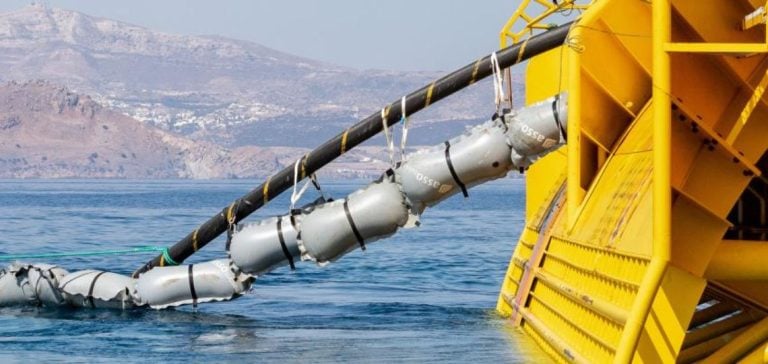The construction of a power cable interconnecting the grids of Europe and the Middle East represents an ambitious and strategic project for the region.
The Great Sea Interconnector (GSI), which will link Greece via Crete, Cyprus and possibly Israel, is estimated to cost 2.4 billion euros.
The project aims to strengthen Cyprus’ energy security while reducing its energy isolation.
Energy Minister George Papanastasiou points out that this initiative will link Cyprus’ national grid to equivalent systems in Europe, which is essential in the current context of energy transition.
A large-scale project
Once completed, the GSI will be the world’s longest and deepest high-voltage direct current (HVDC) interconnector, stretching 1,240 km and reaching depths of 3,000 meters.
The European Union has expressed its intention to finance part of the project, which should be operational by 2030.
Cyprus has pledged to contribute 25 million euros a year for five years to the cost of the project, financed by revenues from carbon trading.
This initiative is part of a wider drive to diversify energy sources and strengthen the region’s energy infrastructure.
The geopolitical implications of this project cannot be ignored.
The GSI crosses a maritime zone with overlapping jurisdictional claims between Greece, Cyprus and Turkey.
Concerns about geopolitical risks, including tensions with Turkey, raise questions about the viability and final cost of the project.
Papanastasiou expressed the need for clarity on financial contributions and the potential implications of regional tensions.
Geopolitical and legal challenges
Harry Tzimitras, Director of the PRIO Cyprus Centre, points out that although countries have the right to install cables in international waters, Turkey claims certain areas as its continental shelf.
This claim could complicate the implementation of the project, as Turkey could require prior consent for work in these areas.
Tzimitras notes that, although this position is difficult to support under international law, Turkey has not yet chosen this path.
Tensions between the countries concerned often seem to focus more on political measures and demonstrations of military power than on legal processes.
In June, Turkey deployed naval assets to monitor a vessel carrying out cable-related survey work near a Greek island, illustrating the continuing tensions in the region.
These events underline the complexity of international relations when it comes to large-scale infrastructure projects.
Future prospects
The GSI represents a significant opportunity for Cyprus and neighboring countries to strengthen their energy integration.
By linking power grids, the project could also foster regional cooperation and energy stability.
However, the success of this initiative will depend on the stakeholders’ ability to navigate the complex geopolitical landscape of the Eastern Mediterranean.
Security, financing and international cooperation will be crucial to the project’s success.
Experts agree that the energy transition requires robust, interconnected infrastructures.
The GSI could serve as a model for other similar projects in the region, fostering a collaborative approach to global energy challenges.
By integrating power grids, countries can not only improve their energy security, but also contribute to the decarbonization of their respective economies.
The implications of this project go beyond mere economic considerations.
They also touch on issues of sovereignty, regional cooperation and sustainability.
As the world moves towards an energy transition, projects like GSI could play a key role in redefining energy relations in the Mediterranean and beyond.






















